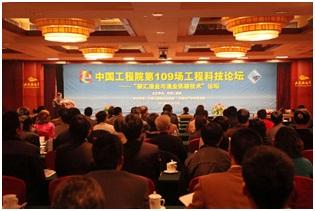
The 109th Engineering Science and Technology Forum on Carbon Sink Fishery and Low-Carbon Technology in Fishery , co-sponsored by the Chinese Academy of Engineering (CAE) and Chinese Academy of Fishery Sciences (CAFS), was held in Beijing from November 19 to 20, 2010. Mr. Pan Yunhe, Executive Vice President of CAE, Mr.
Liang Tiangeng, the Director General of the Personnel Department of the Ministry of Agriculture, together with other officials attended and addressed the forum. The forum was attended by a total of 260 experts and scholars specialized in related fields from institutions of higher learning, research institutes and leading enterprises, as well as CAE Members Tang Qisheng, Shen Guofang, Guan Huashi, Zhao Fazhen, Mai Kangsen, all with the Academic Division of Agriculture of CAE.
After the opening ceremony, CAE Member Tang Qisheng, also the chairman of the forum, gave the first, also the keynote presentation of the forum entitled Carbon Sink Fishery and Sound & Fast Development of Fishery , in which he made an in-depth analysis of the process and mechanism of the formation of fishery carbon sink, and put forward several technical difficulties to be addressed in the development of low-carbon fishery in the future, which can be used in guiding further enrichment and development of carbon sink fishery theoretical framework, technical approaches and application prospects, thus the promotion of the advancement of fishery low-carbon economy.
Afterwards, more than 40 experts presented their academic reports centered upon 7 specialized areas like Carbon Cycle Characteristics in Aquatic Ecosystem and Biological Carbon Sequestration Mechanism , Fishery Biological Carbon Sink Process and Evaluation Techniques , High-Efficiency and Low-Carbon Farming Techniques in Fresh Water , Marine Ranching and Eco-reef Con-struction Technology , Green Safe Feed and Processing Low-Carbon Technology , Fishing Equipments and Energy Conservation & Emission Reduction Technology and so on.
On the two-day forum, participating experts exchanged their viewpoints extensively and vigorously, with the atmosphere in the fo-rum quite lively, and numerous questions raised and discussed. The forum helped to strengthen the communication and exchanges among enterprises, universities and research institutes.
Actually, fishery makes a significant contribution to carbon dioxide emission reduction, because large algae can transform dissolvable inorganic carbon in sea water into organic carbon through the process of photosynthesis, whereas shellfish can use ocean carbon through the promotion of growth. That is to say, shellfish and algae cultivation in shallow sea in China not only provides a large number of high-quality, healthy blue marine food for the human society, but also helps to reduce the carbon dioxide emission in the atmosphere, which is indeed a win-win human activity that should be encouraged.
China is the first country in the world to propose the concept of fishery carbon sink and advocate the development of carbon sink fishery. And the fact that the Carbon Sink Fishery and Fishery Low-Carbon Technology Engineering Science and Technology Forum came to be a complete success, reflects the confidence and courage of China to further promote and implement energy conservation and emission reduction and to stick to the low-carbon development path. It also demonstrates the advanced research ideas and remarkable results of fishery scientific research community in China in this edge-cutting field, which will definitely enhance the ability of China s fishery community to respond to climate change, and play a positive role in the acceleration of the transformation of the development mode, and realization of the transformation of China from a big fishery country to a powerful fishery country. (By Luo Shasha, De-cember 2010; translated by Liu Chang)
Related News
- Engineering Science and Technology Forum on "Digital Design and Innovation" Held in HUST
- Engineering Science and Technology Forum on "Development Tendency of Smart Cities and Digital Home Technology Industry" Held in Guangzhou
- A Total of Over One Hundred "China Engineering Science and Technology" Forums Held Over the Past Decade: Leading Scientific and Technological Development in China
- Volunteers clear traps to protect Siberian tigers





